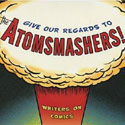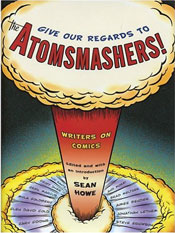
Give Our Regards To The Atomsmashers
Edited by Sean Howe
Pantheon

Comic books have always been associated with nerds and social deviance. However, as editor Sean Howe and his writers inform us, comic books do much more. They mirror the popular culture of their times, and provide an escape for the lost and lonely. Most of all, they offer an escape to better places, where the average guy or gal can have superpowers or fight evildoers at every turn.
Give Our Regards To The Atomsmashers gloriously regales us with seventeen essays about the experience of comics and how they shape our popular culture. It also takes us on a ride through the imaginations of some of today’s most interesting writers, offering us a glimpse as to what they are like and how they got to where they are today as creative spirits.
Throughout Give Our Regards To The Atomsmashers, beneath the nostalgia, collecting, fanaticism and tales of adolescence gone by, two common threads emerge, the battle between the DC and Marvel Universes and the genius of Jack Kirby. An absolute certainty that is brought up several times (most passionately by Jonathan Letham) is that Jack Kirby was a genius. Even today he is cheered throughout the comics industry. Many fans and pros alike believe a pushy Stan Lee robbed Kirby of his due. Others think that he was a sort of quiet mad genius, the Yang to the loud and active Ying of Stan Lee.
Letham’s treatise is an in-depth study in the role of relationships and creative interests. With great care and affable prose Letham recounts his comic book childhood memories and then uses that as a backdrop to provide us a course study in the career of Jack Kirby and his subsequent battle with Stan Lee. What is great is that by the end of Letham’s composition, we feel like we have grown up in Brooklyn, frantically cross-examined and re-read each classic Kirby comic and struggled with the vulnerability of childhood friendship. As in his own books, Letham has brought his childhood to life and transferred it onto us with extreme gusto and bravado.
Gary Giddins is famous for writing about Jazz. However his essay on the lineage of Classics Illustrated is terrific. Howe obviously selected him for inclusion because of his passion about this title. Giddins exuberant and engrossing piece is similarly part memoir and part history.
Everyone who has ever been a rapid collector can feel the agony of Carter Beats The Devil author Glen David Gold as he painstakingly outlines his passion for original comic art, mostly classic Marvel titles, in such a way that by the time he has summarized his passion for the medium we feel as though we too are experts. Gold then tortures us by offering us a tantalizing tale of want that occurred when he stumbled across a vacant old shop filled with comic art. As the story progresses we feel Gold’s inner suffering as each attempt to contact the owner ends in futility. We root for him as he searches, dodges and weaves through frustration after frustration in pursuit of his passion.
Brad Meltzer is a lucky guy. He has managed to establish himself as both a popular novelist (The Zero Game) and a comic book writer (Green Arrow). He is one of those lucky chaps that have a great career being a big little. His contribution, about his fixation with Terra of the Teen Titans, is by far the most touching and personal in the book. Meltzer manages to combine the thrill of discovering a new comic hero with the adolescent awkwardness of puberty. Very few writers have captured the essence of the geek experience like Meltzer.
The other tales within Give Our Regards To The Atomsmashers are not only recollections about the art of comics, tortured youth and lost innocence, but also valuable stories about what drives us to indulge in this unique popular art form. It’s a quirky, thrilling, and compulsively readable celebration of the alchemy of words and drawings that forms the language of comic books. It is a book that will delight the seasoned comic reader and invite everyone else into a whole new world.












